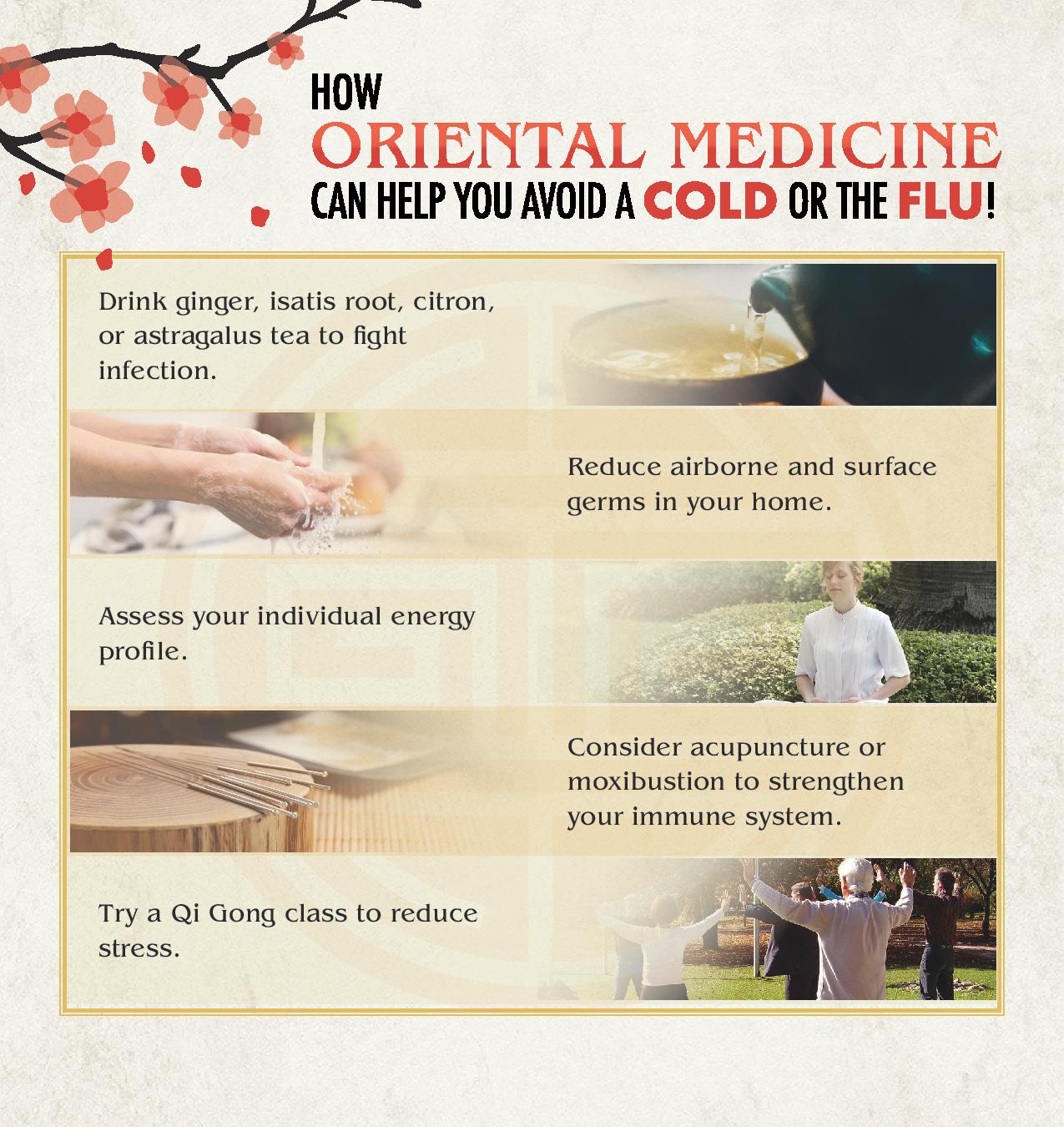Even though it’s cold and flu season, not everyone gets sick. If you’re able to fend off a contagious cold or flu, it may be because you have strong Wei Qi (pronounced “way chee”), according to oriental medicine experts. On the other hand, if you seem to catch every virus going around, you may have weak Wei Qi.
Wei Qi is another way of referring to the body’s immune system or its first defense against infection. Oriental medicine looks at respiratory infections like a cold or flu a little bit differently than western medicine. Good health and resistance to colds and flu requires a strong balance between the body’s internal energy and its Wei Qi or defense against external pathogens.
In addition to common sense precautions like frequent hand-washing, good nutrition, and plenty of sleep, traditional oriental medicine offers additional preventive measures.
Drink ginger, isatis root, citron, or astragalus tea to fight infection.
During the flu and cold season, drinking certain types of tea can keep you hydrated while also helping your body fight viral and bacterial infections. Ginger, which is considered anti-inflammatory, anti-parasitic, anti-viral, and anti-bacterial, has been used in oriental medicine for over 2,000 years for a wide range of health conditions from arthritis to the common cold.
Isatis root tea has similar anti-viral and anti-inflammatory properties. Native to China, isatis root is commonly used in traditional Chinese medicine to treat viral infections and fevers. Astragalus tea is another popular tea in Chinese medicine that can boost the immune system as well as help ease physical and emotional stress. With a significant level of vitamin C, citron tea is also able to stimulate the immune system and increase the production of white blood cells, the body’s first line of defense against infections.
Each of these teas are safe to enjoy multiple times per day over several months. Be sure to brew them without sugar for greater effectiveness.
Reduce airborne and surface germs in your home.
Our homes can be filled with all kinds of bacteria, especially in the winter months when we tend to spend more time indoors. Flu and cold viruses not only linger on surfaces but in the air we breathe as well.
In order to kill the flu virus and other germs, you don’t have to resort to harsh chemicals. Simply boil a 50/50 mixture of water and vinegar on your stove for 20-30 minutes, allowing the steam to circulate throughout your home. This will help reduce both airborne and surface germs, including mold and bacteria. As an added benefit, vinegar also helps dispel any odors.
Additionally, boiling diluted vinegar may help increase humidity levels in your home. According to recent studies, flu viruses are less prevalent in homes with higher levels of humidity.
Consider acupuncture or moxibustion to strengthen your immune system.
See your acupuncturist for regular acupuncture and moxibustion. During a session of acupuncture, a licensed practitioner gently places hair-thin needles under the skin at different parts of your body. Certain points can help stimulate and strengthen your immune system.
For those who are afraid of needles, moxibustion is another option. This special technique uses gentle heat applied to specific acupuncture points to strengthen the immune system.

Assess your individual needs.
According to oriental medicine, each individual’s energy profile is unique. A person’s Wei Qi can have a particular weakness where excess heat, cold, dampness, or dryness creates an imbalance in the body. Any one of these excesses can act like a pathogen and make someone more vulnerable to a cold or flu virus.
In addition to other biological factors, these excesses can also influence cold or flu symptoms. That’s why some people may get sniffles, sore throat, and a fever, while others get a cough and a headache with a cold instead. An oriental medicine clinician will make a careful diagnosis to determine the exact nature of the energy imbalance in each individual, and prescribe specific herbs that correspond to each patient’s unique imbalance that causes them to contract a cold or flu.
Try a Qi Gong class to reduce stress.
Keeping your stress levels in check, while often overlooked, can be a powerful tool in maintaining a strong immune system. Qi Gong in particular can help you de-stress and support strong and balanced Qi energy in your body, including your Wei Qi, which ultimately boosts your immune system.
Similar to Tai Chi, Qi Gong involves slow movements, deep breathing and meditation. According to research utilizing randomized controlled trials, this type of exercise can have significant health benefits.
Along with these prevention measures, oriental medicine can help treat the symptoms of an existing cold and flu as well. If you have already been exposed to a cold or flu, there are many herbal formulas available to boost the Wei Qi and reduce pathogenic Qi. Since each case is different, there is no one single oriental herbal prescription or acupuncture treatment prescribed for every case of cold or flu.
In oriental medicine, herbal formulas are customized for each individual after a thorough examination. To learn more about how oriental medicine practitioners uniquely treat patients visit the NUHS website.
{{cta(‘b7d331ad-fee8-45d2-9abd-f26523a7e68e’)}}




0 Comments